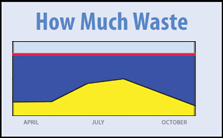Water Use Legislation Should Be Greener Says United Nations
Governments and lawmakers need to integrate environmental concerns into water-use legislation to avert an impending global water crisis, according to a new report from the UN's Environment Program (UNEP) entitled 'Greening Water Law.'
According to the report, competition is increasing between the rapidly growing human population which needs water for drinking, sanitation, food production, economic development, and ecosystems which rely on water to sustain their existence.
The key challenge now facing governments across the world is how to meet the growing water needs of human society, while maintaining freshwater ecosystems and supporting environmental sustainability.
Nearly 1.8 million children under the age of five die each year from diarrheal diseases (such as cholera, typhoid and dysentery) due to a lack of safe drinking water and basic sanitation. The UNEP report warns that if the international community fails to take action to improve freshwater supplies for drinking, sanitation and hygiene purposes, as many as 135 million preventable deaths could occur by 2020.
The unsustainable use of freshwater is a major contributor to bio-diversity loss – and the effects are being felt in rivers, lakes and wetlands across the world. In North America, for example, around 27 per cent of continental freshwater fauna populations are now threatened with extinction as a result of depleted and contaminated freshwater resources.


